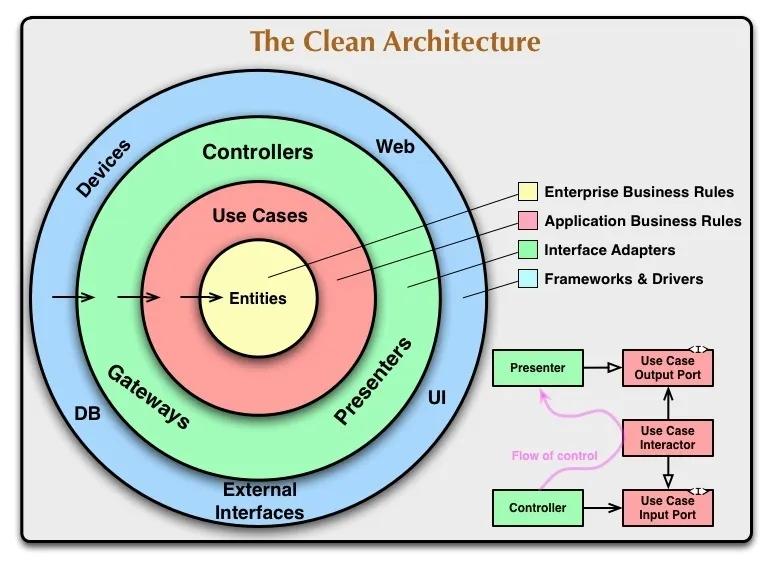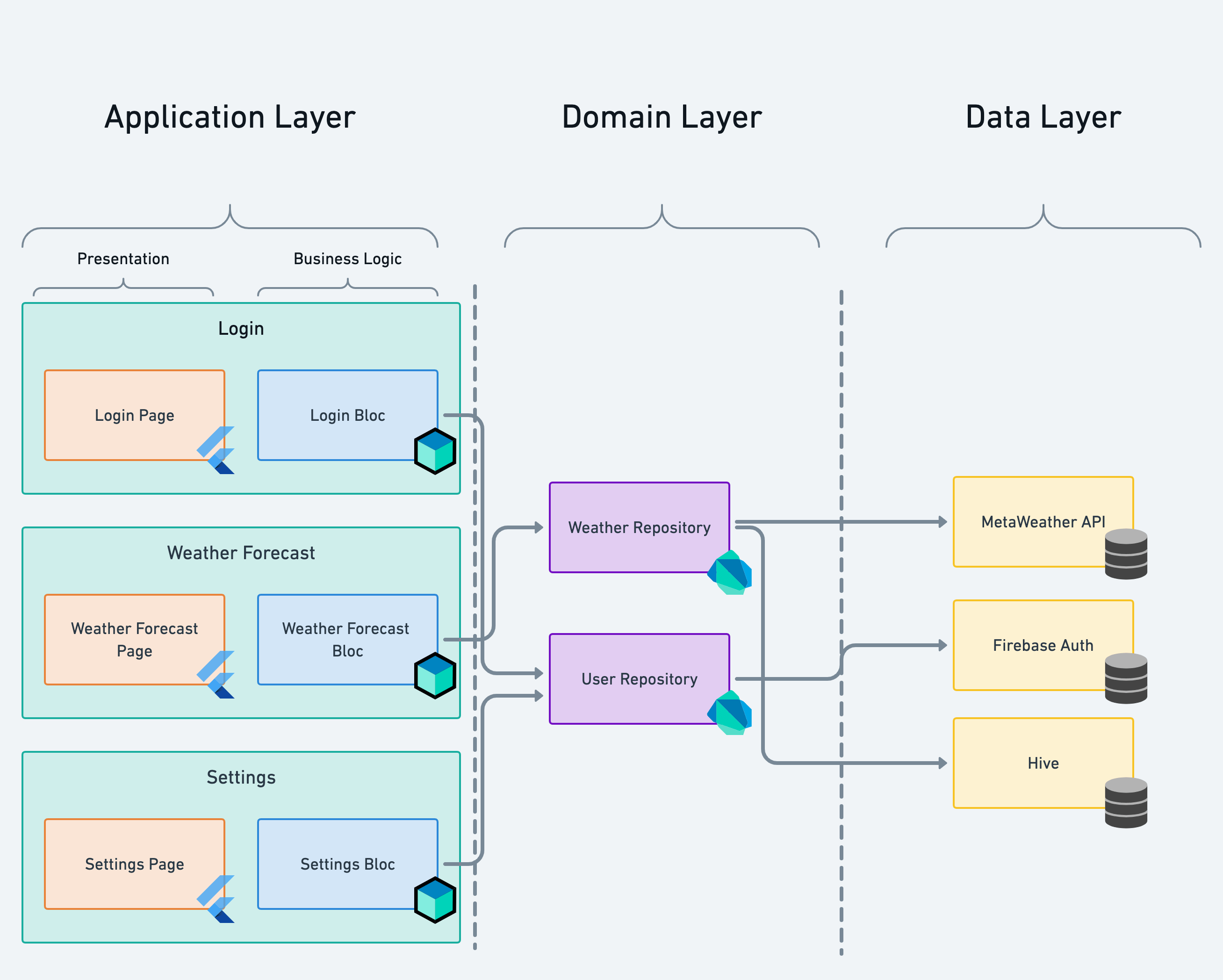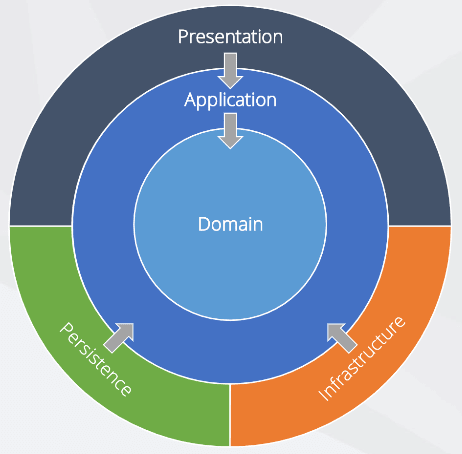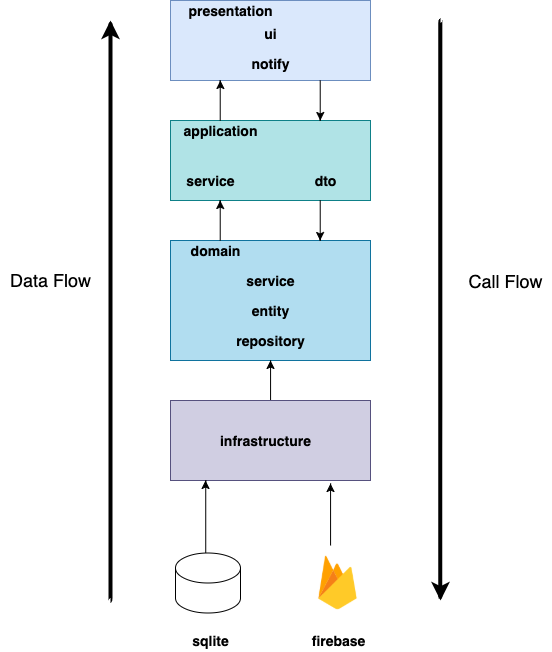Flutter 项目架构合集
Clean Architecure
在CA,我们遵循一个有三层的架构
- 数据层
- 域层
- 功能层
我们还有 2 个额外的支持层,即资源层和共享库层

调用流如下所示。
示例结构
├── core
| ├── user
│ │ ├── data
│ │ │ ├── dto
│ │ │ │ └── user_dto.dart
│ │ │ │ └── user_response_dto.dart
│ │ │ ├── datasource
│ │ │ │ └── user_remote_datasource.dart
│ │ │ │ └── user_local_datasource.dart
│ │ │ ├── mapper
│ │ │ │ └── user_mapper.dart
│ │ │ ├── repository
│ │ │ │ └── user_repository.dart
│ │ │ ├── di
│ │ │ │ └── dependency.dart
│ │ ├── domain
│ │ │ ├── repository
│ │ │ │ └── user_repository_impl.dart
│ │ │ ├── entity
│ │ │ │ └── user_entity.dart
│ │ │ ├── usecase
│ │ │ │ └── get_user_list_usecase.dart
│ │ │ │ └── get_user_detail_usecase.dart
│ │ │ ├── di
│ │ │ │ └── dependency.dart
├── feature
| ├── user
│ │ ├── page
│ │ │ └── user_list_page.dart
│ │ │ └── user_details_page.dart
│ │ ├── controller
│ │ │ └── user_list_controller.dart
│ │ │ └── user_details_controller.dart
│ │ ├── widget
│ │ │ └── user_card_widget.dart
Very Good Architecture
在VGV,我们遵循一个有四层的架构。
- 数据层:这一层负责与API交互。
- 域层:这是负责转换来自数据层的数据的层。
- 业务逻辑层:这一层管理状态(通常使用flutter_bloc)。
- 表示层:基于状态呈现UI组件。
域层将原始数据转换为业务逻辑层使用的特定于域的模型。业务逻辑层保持存储库提供的域模型的不可变状态。此外,业务逻辑层对来自 UI 的输入做出反应,并在需要根据状态进行更改时与存储库进行通信。

示例结构
├── lib
| ├── posts
│ │ ├── bloc
│ │ │ └── post_bloc.dart
| | | └── post_event.dart
| | | └── post_state.dart
| | └── models
| | | └── models.dart
| | | └── post.dart
│ │ └── view
│ │ | ├── posts_page.dart
│ │ | └── posts_list.dart
| | | └── view.dart
| | └── widgets
| | | └── bottom_loader.dart
| | | └── post_list_item.dart
| | | └── widgets.dart
│ │ ├── posts.dart
│ ├── app.dart
│ ├── simple_bloc_observer.dart
│ └── main.dart
├── pubspec.lock
├── pubspec.yaml
Onion Architecture
在OA,我们遵循一个有四层的架构。
- 表示层:包括用户界面和通知程序(Provider)。Ui 层负责页面和模板、生物体、原子(我们采用原子设计),通知器层负责状态管理。
- 应用层:包括 dto 和 usecase(*_service.dart)。Dto 层负责从基础架构层传输数据对象。Usecase 负责表示层的 usecase(用户的操作)。
- 域层:包括模型和服务。模型层负责价值对象和域对象、存储库接口。服务层负责域服务。
- 基础架构层:包括存储库、firebase 和 sqflite。仓库层负责仓库接口的实现。Firebase 图层和 Sqflight 图层负责这些数据库的初始设置。
此图显示了洋葱架构的工作原理。域是中心,包括实体和值对象。包括用户界面和状态管理、基础结构和持久性在内的表示取决于应用程序,而应用程序取决于域。它是单向的。

数据流和调用流如下所示。

示例结构
├── application
│ ├── dto
│ ├── *_service.dart
├── domain
│ ├── model
│ └── service
├── infrastructure
│ ├── firebase
│ ├── repository
│ └── sqflite
├── main.dart
└── presentation
├── notifier
└── ui
└── pages
└── templates
└── organisms
└── atoms
Domain Driven Design
采用领域驱动设计的优点如下
- 责任变得清晰(尤其是在模型层)
- 其他成员可以很容易地理解架构。
AppFlowy的操作流程 https://docs.appflowy.io/docs/documentation/software-contributions/architecture/domain-driven-design#operation-flow
presentation │ Application domain Infrastructure
│ │
7 Data Model
┌─────────────────────────��─────┐ │ ┌────────────────────────┐ │ ┌─────────────────────┐
│ │ │ │ ┌─────────────┐ │ │ Network Service │
▼ Bloc │ │ │ │ Aggregate │ │ │ └─────────────────────┘
┌─────────────┐ │ ┌─────────────────┴─────┐ │ └─────────────┘ │ ▲
────────▶ Widget │ │ ┌────────┐ ┌────────┐ │ 2 │ ┌────────┐ │ │ │ 6
└───────────�──┘ │ │ │ Event │ │ State │ │────┬───▶│ │ Entity │ │ ┌─────────────────────┐
User │ │ └────────┘ └────────┘ │ │ │ │ └────────┘ │ │ │ Persistence Service │
interaction │ │ └──────▲────────────────┘ │ │ ┌─────────────────┐ │ └─────────────────────┘
│ │ │ │ │ │ Value Object │ │ │ ▲
└──────────┼────────┘ │ │ └─────────────────┘ │ │ 5
1 │ │ └────────────◈───────────┘ │ ┌─────────────────────┐
│ │ │contain │ Unit of Work │
│ │ ┌────────────────────┐ │ └─────────────────────┘
│ │ │ Service │ ▲
│ │ └────────────────────┘ │ │
│ │ │ 4
│ │ Repository │ │
│ │ ┌─────────────────────────────────────────────┴───────────────┐
│ │ │ ┌ ─ ─ ─ ─ ─ ─ ─ ─ ─ ─ ─ ┐ 3 ┌ ─ ─ ─ ─ ─ ─ ─ ─ ─ ─ ─ ─ ─ ┐ │
│ └───┤ Interface ────▶ Implementation │
│ │ └ ─ ─ ─ ─ ─ ─ ─ ─ ─ ─ ─ ┘ └ ─ ─ ─ ─ ─ ─ ─ ─ ─ ─ ─ ─ ─ ┘ │
│ └─────────────────────────────────────────────────────────────┘
│
Modern Architecure
Software Architecture Patterns
Model View Controller
model 模型:代表应用程序的数据和业务逻辑。
view 视图:处理用户界面 (UI) 并向用户显示数据。
controller 控制器:充当模型和视图之间的中介,在模型更改时更新视图并处理用户交互。
Model View Presenter
model 模型:代表应用程序的数据和业务逻辑。
view 视图:处理 UI 并向用户显示数据。
Presenter:充当模型和视图之间的中介,为视图准�备数据并处理用户交互。
Model View View-Model
model 模型:代表应用程序的数据和业务逻辑。
view 视图:处理 UI 并向用户显示数据。
view model:充当模型和视图之间的中介,公开模型中的数据并处理用户交互。
参考资料:
Flutter中非常好的分层架构 --- Very good layered architecture in Flutter
https://medium.com/@ushimaru/beginners-guide-to-flutter-with-ddd-87d4c476c3cb